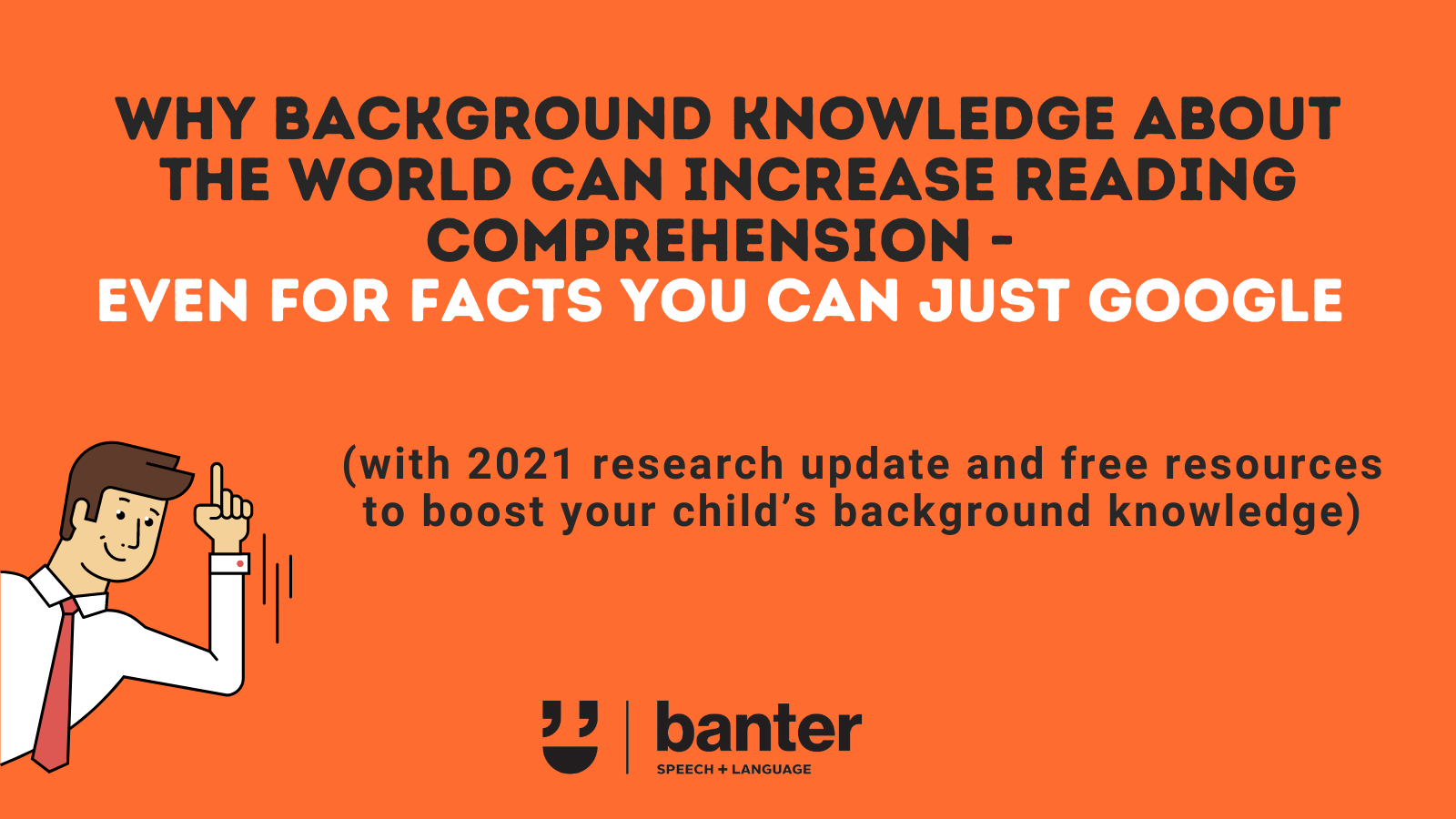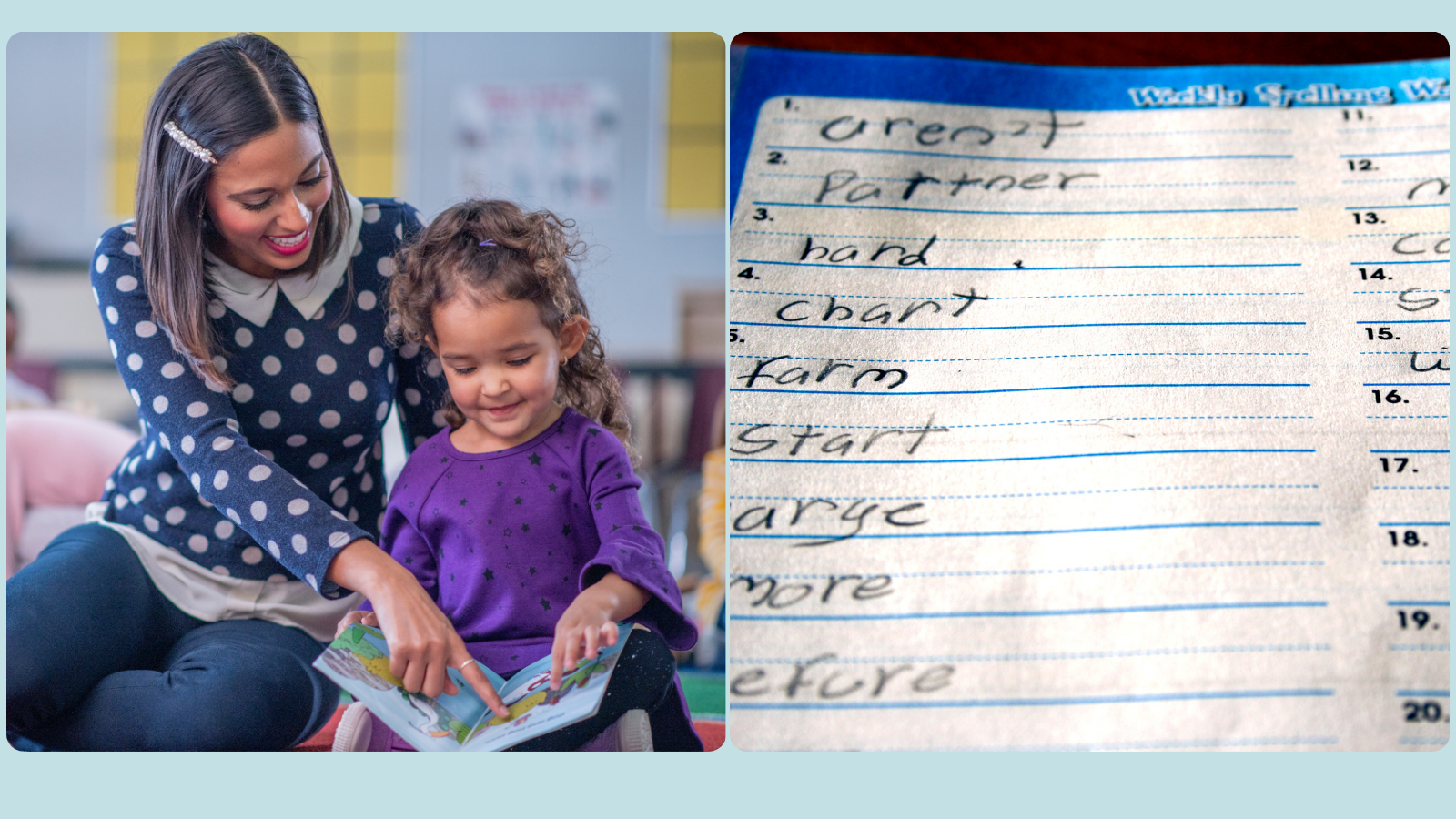Why background knowledge about the world can increase reading comprehension – even for facts you can just Google (with 2021 research update and free resources to boost your child’s background knowledge)
It seems obvious but I’ll state it anyway: we read things to understand them. If students can’t understand what they’re reading at school, they will struggle to cope with the curriculum.
Reading comprehension is complex, but, according to the Simple View of Reading, it is the product of two proximal variables: word recognition and language comprehension skills.
To understand what we read, we need lots of skills, including:
- alphabet decoding: including letter-sound links and the ability to blend speech sounds together to make words;
- fluent word recognition: including gaining access to the meaning of words directly from the spelling without needing to decode them phonically;
- oral language, including:
- vocabulary;
- semantic networks;
- sentence processing, including understanding of complex syntax;
- higher level language skills;
- comprehension monitoring skills, like summarising, finding key words and main ideas, and elaborative interrogation skills (although there is a debate about whether these ‘strategies’ are in fact better described as outcomes of good comprehension (e.g. Shanahan, 2018)); and
- knowledge of text types, such as story grammar (Castles et al., 2018);
- the cognitive ability to build mental models or situation models of the people, events, objects, places and actions described in the text, and the relations between them (e.g. Tapiero, 2007); and
- inferencing skills and background knowledge.
What do we mean by “background knowledge”?
Background knowledge is all the world knowledge a reader brings to the task of reading a text (Smith et al., 2021). It includes events, facts, procedural knowledge (how to do things), as well as related vocabulary (Kintsch, 1998). Some researchers call it “prior knowledge”. Background knowledge about specific or defined fields, like engineering, medicine, or law, is often referred to as “domain knowledge” (Alexander & Jetton, 2000).
Let’s use an example to illustrate how background knowledge may affect reading comprehension. Consider this excerpt from a Wikipedia article on American Football strategies (a topic I know very little about):
“Despite the multi-receiver sets, the spread option is a run-first scheme that requires a quarterback that is comfortable carrying the ball, a mobile offensive line that can effectively pull and trap, and receivers that can hold their blocks. Its essence is misdirection.”
What’s my background knowledge here? (This will be embarrassing!)
I know American Football is a popular team sport in the US, and I know some Australians play it, too. I know about quarterbacks, and Tom Brady and the Tampa Bay Buccaneers from watching the news. I know how the field is laid out in a grid – hence the term gridiron. In the 1980s, I watched some terrible TV movies that involved American football. I’m aware of the annual hoopla about the cost of Super Bowls ads. I watched a Super Bowl with some American friends on TV when I worked for a US Investment bank, although I had no idea what was going on. I know about scoring touchdowns. A high school friend used to play an American football game on his PC, so I know about setting for offensive and defensive plays. Way back in 1997, I even watched part of a high school football game in Rochester, Minnesota, although all I remember is lots of waiting around and my hosts being very focused on statistics.
What else do I know that might help me to understand the excerpt? I know about “misdirection” from my failed attempts to be a magician at around 10 years of age. I know the ordinary meaning of each word in this excerpt.
What don’t I know? I have no idea what some of the technical terms mean in context (e.g. “run-first”, “pull and trap”). Nor do I know exactly what the words mean together because of my ignorance of how plays in the game are determined. I can get a rough idea – the gist – of the passage by drawing on my knowledge of other football codes, such as Rugby League and Aussie Rules. But the truth is, I lack the background knowledge to understand the simple-to-read passage fully.
In a comprehension test, I would do fine with questions that required me to look back and find answers. I would have more difficulty with questions that required me to understand unstated details or to draw inferences about football. My comprehension of the passage would certainly lag that of a regular American football viewer. And I had to work much harder to access and recall things than would someone who has watched games recently.
Reading research shows that background knowledge about a topic may assist the reading comprehension of older school-aged children and adults when reading about the same topic. Recent research suggests that higher levels of background knowledge on a topic may, to a degree, also boost young school-aged children’s reading comprehension of a text on the same topic – although background knowledge levels appear to affect stronger and weaker readers differently (Smith et al., 2021 – see below).
So background knowledge may help improve reading comprehension. But we must take care not to overstate its effects for two main reasons:
Caveat 1: background knowledge is just one sub-component of one element of the updated Simple View of Reading
The cognitive foundations framework, developed by Hoover & Tunmer based on the Simple View of Reading, recognises that background information and inferencing skills are sub-components of language comprehension. However, both the Simple View of Reading and the cognitive foundations framework model state that:
Reading comprehension = word recognition x language comprehension.
The models predict that, if word recognition is very poor, then reading comprehension will also be poor regardless of background knowledge because:
- multiplying anything by zero equals zero; and
- if a reader cannot decode the text they are reading, they will not know what they are reading about, which will prevent them from using language skills or their background knowledge to compensate.
Background knowledge may also not be sufficient to compensate for poor oral language skills – especially if the reader cannot understand the words used in the text (language content), process the grammar used in the text (language form), or understand the conventions of type of text they are reading (language use), or simply not understand the questions they are being asked to probe their comprehension (e.g. questions containing academic words).
Caveat 2: Students struggle with reading comprehension for lots of reasons
Limited background knowledge about a topic may affect comprehension. But it’s important to remember that multiple factors – alone or in combination – explain why many students struggle with reading comprehension, including:
- poor word recognition skills;
- language difficulties, including developmental language disorders and difficulties with verbal reasoning;
- working memory limitations; and
- difficulties with executive functioning, e.g. attention issues (e.g. Cutting & Scarborough, 2006).
Astute readers will note that these caveats say the same thing in two ways: don’t overestimate the effect of background knowledge on reading comprehension, especially while students are learning foundational word recognition and language skills.
So what does the research evidence say?
To most people, it seems obvious that people will understand what they read better if they already know lots about the topic of the text. But things are more complicated – especially when you consider some of the technical research about Cognitive Load Theory, and primary and secondary knowledge.
For older students, we know that:
- struggling readers tend to have less developed content knowledge and greater difficulties using knowledge to build mental models of what they read (e.g. Bransford et al., 1981; Oakhill, 1983);
- readers with more knowledge on a topic outperform others with the same reading skills but less knowledge of the topic on reading-comprehension tasks (e.g. Recht & Leslie, 1989);
- having some knowledge of a topic in a passage is positively associated with correctly answering questions about the passage (Compton et al., 2013);
- struggling readers with poor background knowledge have difficulty recalling a passage’s main ideas, but when given background knowledge can often do so (Miller & Keenan, 2009); and
- without well-connected knowledge, students have difficulty making inferences (e.g. Kendeou & van der Broek, 2005; McNamara & Magliano, 2009). (Knowledge about the world helps us to make inferences about what we are reading: to connect new information in the text with information about the topic that we have already stored in our long term memories.)
In a recent critical review of peer-reviewed studies, Smith and colleagues looked at the effects of background knowledge on the reading comprehension of middle-to-late primary school-aged students (Smith et al., 2021). The underlying evidence base is really messy, in part because of different definitions, assessment tasks, and outcome measures used in different studies. But the researchers found that, in general:
- higher levels of background knowledge enable primary school children to better understand a text;
- as you would expect, students with strong knowledge of a topic are better able to comprehend a text about the topic than a similar text about a different topic that they don’t know as much about;
- good background knowledge may compensate in part for low reading ability (and vice versa):
- Low-skilled readers with strong knowledge can compensate to some extent for poor reading skills.
- High-skilled readers with poor knowledge can compensate to some extent for poor knowledge with good reading skills;
- the compensatory effects of background knowledge were less pronounced when children were asked to make inferences. In particular, low skill readers with good background knowledge were not able to compensate for their poor reading while inferencing.
- The effect of background knowledge on reading comprehension depended in part upon the text’s:
- cohesion (aka microstructure): the visibility of the links between phrases and sentences, e.g. lots of details to compensate for lack of background knowledge; and
- coherence (aka macrostructure): the extent to which the text provides information and cues to help the reader make connections across different parts of the text with things like headings, and conjunctions to help link and contrast ideas.
- As you would expect, readers with less knowledge were assisted by texts with high cohesion and coherence.
- Interestingly, readers with high knowledge generated a more complete situation model when the text had less cohesion – a “reverse cohesion effect” perhaps related to the theory that expert learners benefit from reduced guidance and support (in contrast to novices).
- Low skill readers were more likely to rely on background knowledge instead of what was in the text (even if the text conflicted with background knowledge) than high skill readers who were better able to spot inconsistencies.
How might background knowledge help reading comprehension?
Having a vast store of quickly available, previously acquired knowledge enables the mind to take in new information in less time and with less effort and to link it to existing knowledge (Hirsch, 2003). Background knowledge may:
- speed up basic comprehension and leaves working memory free to make connections between new and previously learned information;
- help readers to make sense of word combinations that have ambiguous meanings. Knowing, for example, that “I slipped off the bank and made a huge splash” is about falling off a riverbank, and not a saving and lending institution;
- help with inferencing, e.g. making sense of: “The explorers huddled in their tent, 20 kilometres away from the South Pole”, is easier to understand if you know it’s very cold in Antarctica; and
- help older students to understand metaphor, idiom, irony, sarcasm, and other higher level language uses, e.g. “Victory is sweet”, “Don’t count your chickens” or “Donald Trump absolutely loves CNN”.
Why is the discussion about the teaching of background knowledge so controversial?
It’s a mystery to me. Before I trained to become a speech pathologist, I thought that everyone believed that we should teach school-aged children lots of facts about the world in a methodical, logical, and systematic way.
I was wrong.
Some people think knowledge is overrated and that students can Google facts if and as they need them. Others think that children learn knowledge best by following their interests and natural curiosities, rather than learning facts from expert teachers in a sequenced, structured way. Yet others seem to think that parents should be responsible for building knowledge outside of school hours (which seems a little unreasonable, especially for many families with histories of communication issues and families from low socioeconomic backgrounds).
Some researchers think that young students – especially in the early years of school – spend too little time reading non-fiction, information-based texts (e.g. Danilow et al., 2013; Palinscae & Duke, 2004). Other researchers think that some teachers focus too much, for too long, on comprehension strategies and generic skills like critical thinking, and not enough time imparting knowledge about the world (e.g. Catts & Kahmi, 2017). For example, we know that there are no additional benefits to reading comprehension performance after around fifteen hours of instruction in generic comprehension strategies (e.g. Elleman, 2017; and Stevens et al., 2019).
Needless to say, not everyone agrees!
What we do know is that, as readers develop, they need more advanced reading strategies to cope with the curriculum, especially for specialised areas of the curriculum like history, science and maths, where domain knowledge (a subset of background knowledge) is very important (e.g. Shanahan & Shanahan, 2008 and 2012).
How can we improve a child’s background knowledge? Free resources and tips
Here are several suggestions and resources, many of which are completely free:
- Read/listen to more information/non-fiction texts. This will help children learn words and concepts needed to understand the news, social media, and books aimed at the general public. (When younger, my kids were big fans of Horrible Histories, for example, which has given them (amongst other things) a surprisingly solid understanding of the history and major personalities of the Roman Empire and Kings and Queens of England.)
- Read fiction that is set in real places or time periods, e.g. “The Hole in the Dike“ or books set during major world events like the World Wars.
- Avoid jumping from topic to topic without considering knowledge development. Instead, pair narrative and expository text within a topic or theme. There are some great online resources you can use for this, e.g.:
- Use various media, e.g. listening to podcasts, watching YouTube videos or movies about a topic as well as reading about it (e.g. Kendeou et al., 2008). For example, use interactive online resources such as:
- Use read-alouds in class until Year 8 (Chall et al., 1996).
- Explicitly teach content-related vocabulary. Here’s a free tool to teach a child new words. Here’s another resource from the Florida Center for Reading Research.
- Morphemic awareness training, which may be more useful in some areas (e.g. science) than others (e.g. history).
- Semantic feature analysis (e.g. Bos & Anders, 1990), e.g. for a free template, see Reading Rockets.
- Discussion about texts, which have been shown to increase comprehension (Gersten et al., 2001).
- Close reading of texts with repeated readings of complex short texts (e.g. Fisher & Frey, 2014).
- Using Frameworks or Schema to help kids to assimilate new information more quickly, e.g.:
- Story structure maps, like this free one, have been shown to improve reading comprehension (Perfetti et al., 2005).
- Graphic organisers for story mapping, expository texts and concept mapping (e.g. Gersten et al., 2001). See several free ones from the Florida Center for Reading Research.
- Knowledge Organisers. I used these to summarise my notes at school and uni and love them! You can read more about knowledge organisers here.
- Use sequencing, cause-effect relationships and related “signal words” to help students determine the structure of a text, for example, words like:
- first, second, next, last, while, during, after, before, then, until, immediately and meanwhile, signal a time (or temporal) structure, like a procedure;
- either/or, neither/nor, compared with, likewise, similarly, yet, differ, different and however, signal a compare/contrast relationship;
- because, so, thus, therefore, if/then, for this reason, accordingly and as a result, signal a cause and effect relationship;
- in order to, problem, solution, steps, may be due, solve, result and leads to, signal a problem and solution text; and
- is like, by way of illustration, including, for instance and as [big] as a, signal a description.
- Get out and explore the real world together.
Some examples of full programs that integrate reading and knowledge content instruction
- Promoting Adolescents’ Comprehension of Text from The Meadows Center for Preventing Educational Risk (e.g. Vaughan et al., 2013).
- In-Depth Expanded Application of Science (e.g. Romance & Vitale, 2001).
- Core Knowledge Foundation Curriculum.
Clinical bottom line
To improve a child’s reading comprehension skills, foundation skills training based on the Simple View of Reading is essential. We go into what this entails in much more detail here.
Systematic knowledge-building is not enough on its own to compensate for poor reading skills. But background knowledge can help students to learn new information more efficiently, including when reading, and to understand how the world works.
In this article, we’ve highlighted a number of resources to help parents and teachers help children to increase their knowledge of the world around them. We hope they are helpful!
Principal sources:
- Elleman, A.M. & Compton, D.L. (2017). Beyond Comprehension Strategy Instruction: What’s Next? Language, Speech, and Hearing Services in Schools, 48, 84-91.
- Hirsch, Jr., E.D. (2003). Reading Comprehension Requires Knowledge – of Words and the World, American Educator, Spring, 10-46.
- Smith, R., Snow, P., Serry, T., and Hammond, L. (2021). The Role of Background Knowledge in Reading Comprehension: A Critical Review. Reading Psychology, 42(3), 214-220.
Related articles:
- “I don’t understand what I’m reading” – reading comprehension problems (and what to do about them)
- “All models are wrong, but some are useful”: 11 reasons we use the Simple View of Reading to help people with reading difficulties
- For beginning readers, where should we start teaching? Phonics, sight words, or both?
- Teaching the alphabet to your child? Here’s what you need to know
- Beginning readers’ brains are not the same as skilled readers’ brains, so stop teaching beginners to read like they are adult experts
- Oral language: what is it and why does it matter so much for school, work, and life success?
- Five ways to boost your child’s oral language and reading comprehension skills with sequencing
- What I think about when I meet a child who can’t read
- For reading, school and life success, which words should we teach our kids? How should we do it?
- Dyslexia vs Developmental Language Disorder: same or different, and what do we need to know about their relationship?
- “In one ear and out the other”. FAQs: working memory and language disorders
- My child has ADHD. Should I get his/her language checked?
- For struggling school kids, what’s the difference between seeing a speech pathologist and a tutor?
- Help your child to fill in the gaps, join the dots, and read between the lines! (Improve inferencing skills for better reading and language comprehension)
- Why poor kids are more likely to be poor readers (and what we can do about it)
- 6 strategies to improve your child’s reading comprehension and how to put them into practice

Hi there, I’m David Kinnane.
Principal Speech Pathologist, Banter Speech & Language
Our talented team of certified practising speech pathologists provide unhurried, personalised and evidence-based speech pathology care to children and adults in the Inner West of Sydney and beyond, both in our clinic and via telehealth.








